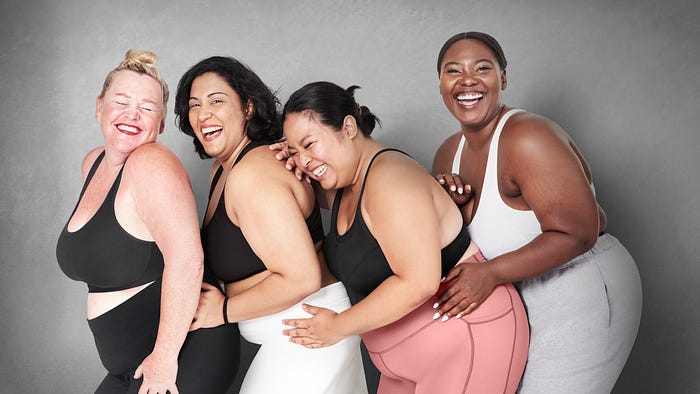
Bigger Bodies are the new norm but there are still societal challenges
Share
According to recent statistics, nearly 70% of adults in the country are classified as either overweight or obese. But what if we started to rethink the way we view body size? What if we stopped seeing being thin as the ultimate goal and instead focused on overall health and wellness?
First of all, it’s important to acknowledge that body size is not always an accurate indicator of health. There are many people who are classified as “overweight” or “obese” based on their BMI (body mass index), but who are actually fit and healthy. On the other hand, there are people who are thin but have unhealthy habits and are at risk for various health problems.
Instead of fixating on a certain body size or weight, we should focus on adopting healthy habits that promote overall well-being. This includes getting regular exercise, eating a balanced diet, and getting enough sleep. These behaviors are important for everyone, regardless of their size or shape.
It’s also worth noting that the societal pressure to be thin can have harmful consequences. The diet industry is a multi-billion dollar industry that preys on people’s insecurities and often promotes unhealthy or unsustainable weight loss strategies. This pressure to conform to a certain body size can lead to disordered eating and negative body image, which can have serious mental health consequences.
Instead of buying into this societal pressure, we should embrace body positivity and acceptance. Everybody is different and we should celebrate the diversity and uniqueness of our bodies rather than striving for an impossible standard of beauty.

Are bigger bodies the new norm?
There is a widespread perception that larger body sizes are becoming more common and accepted in society. But this perception is supported by data showing that the prevalence of obesity has increased significantly in recent decades. In the United States, for example, the percentage of adults who are classified as obese has more than doubled since the 1970s. The problem is that the word obese and obesity are problematic.
However, it is important to note that the idea of “normal” body size is largely a social construct and can vary significantly across different cultures and time periods. While larger body sizes may be more common in certain populations, there seems to be a continued challenge with identifying bigger bodies as the new norm.
On the other hand, the concept of “normal” body size often excludes a wide range of body types and shapes, leading to a narrow and potentially harmful standard of beauty. It is important to recognize and celebrate the diversity of body sizes and shapes rather than trying to fit into a narrow definition of what is considered normal. But this is not about normal but the new statistical fact that bigger bodies are the new norm.
Ways to be more supportive and accepting of bigger bodies
- Educate yourself about the root causes of obesity and weight stigmas, such as systemic inequalities and the diet industry.
- Use inclusive language when discussing body size and avoid making assumptions about a person’s health or lifestyle based on their appearance.
- Refrain from making comments or jokes about someone’s body size, even if you think you are being supportive or complimentary.
- Don’t participate in fatphobic conversations or behaviors, and call out fatphobia when you see it.
- Support body positivity and fat acceptance movements, and promote the idea that all bodies are worthy of respect and acceptance.
- Avoid imposing your own body size ideals on others and recognize that everyone has the right to make their own decisions about their body.
- Avoid using weight loss as a measure of success or self-worth, and recognize that there are many ways to be healthy and happy at any size.
- Seek out diverse representation in the media and support content creators who promote body positivity and inclusivity.
- Be mindful of your own biases and try to challenge any negative attitudes you may have about larger body sizes.
- Remember that everyone has the right to feel comfortable and confident in their own skin, no matter what their size or shape.
- Recognize that weight stigma and discrimination can have serious negative impacts on mental and physical health, and work to create a more inclusive and accepting environment.
- Support policies and initiatives that promote body positivity and address the root causes of obesity, such as access to healthy food options and opportunities for physical activity.
- Encourage friends and loved ones to focus on overall health and well-being rather than trying to conform to a certain body size or weight.
- Be an ally to those who experience weight stigma and discrimination, and speak up when you see others being treated unfairly because of their body size.
- Recognize that body size is just one aspect of a person’s identity and that there is much more to a person than their appearance.
- Don’t judge or criticize others for their appearance or choices related to their body size, and instead focus on building positive, supportive relationships.
- Remember that everyone has the right to feel comfortable and confident in their own skin, and work to create a culture that values and celebrates diversity in all forms.
It is important to recognize that body size is a complex issue and there is no one-size-fits-all solution. However, there are steps we can take to be more supportive and accepting of bigger bodies and create a more inclusive and accepting society. This includes educating ourselves about the root causes of obesity and weight stigma, using inclusive language and supporting body positivity and fat acceptance movements. It also involves challenging our own biases and avoiding imposing our own body size ideals on others. By focusing on overall health and well-being and embracing diversity in all forms, we can create a culture that values and celebrates everybody. Overall, it is important to recognize that everyone has the right to feel comfortable and confident in their own skin and to work towards creating a more inclusive and accepting society for people of all body sizes and shapes.

Why this issue is important and what it means for the future
The issue of weight stigma is important for a number of reasons. Weight stigma and discrimination can also have serious negative impacts on mental health, leading to negative body image, low self-esteem, and even depression and anxiety. It is important to recognize that everyone has the right to feel comfortable and confident in their own skin, regardless of their size or shape.
In addition to the individual impacts, weight stigma also has societal implications. Weight discrimination is a form of discrimination that is still widely accepted and tolerated, despite the fact that it can have serious consequences for those who experience it. This creates an environment where certain groups are marginalized and discriminated against, which can have far-reaching impacts on their ability to participate fully in society.
In order to address these issues and create a more inclusive and accepting society, it is important to recognize the root causes of weight stigma, such as systemic inequalities and the diet industry, and to work towards creating a culture that values and celebrates diversity in all forms. By taking these steps, we can create a brighter and more inclusive future for people of all body sizes and shapes.
If bigger bodies are the new norm, can we stop using the word obesity?
The idea that larger body sizes are becoming the “new norm” is a complex and controversial topic. While it is true that the prevalence of bigger bodies has increased significantly in recent decades, it is important to recognize that the concept of a “normal” body size is largely a social construct and can vary significantly across different cultures and time periods. In addition, the idea of a “normal” body size often excludes a wide range of body types and shapes, leading to a narrow and potentially harmful standard of beauty.
Using the word “obesity” to describe a person’s body size can contribute to weight stigma and discrimination, as it implies that there is something inherently wrong or unhealthy about being larger. It is important to recognize that body size is not always an accurate indicator of health and that there are many factors that contribute to an individual’s weight, including genetics, lifestyle, and environmental factors.
Rather than focusing on labels or trying to fit into a narrow definition of what is considered normal, it is important to recognize and celebrate the diversity of body sizes and shapes. This includes promoting body positivity and acceptance and focusing on overall health and well-being rather than trying to conform to a certain body size or weight. By doing so, we can create a more inclusive and accepting society for people of all body sizes and shapes.

Obesity is no indication of a person’s level of fitness
I want to drill home this point because it is important to recognize that obesity is not necessarily an indication of a person’s level of fitness. While obesity is defined as having a body mass index (BMI) of 30 or higher, BMI is a measure that is based on height and weight and does not take into account factors such as muscle mass, bone density, and overall body composition. As a result, it is possible for a person to have a high BMI but still be fit and healthy, or for a person with a low BMI to be unhealthy.
It is also worth noting that the focus on weight and BMI as the primary indicators of health can be harmful and can lead to weight stigma and discrimination. Rather than fixating on weight or size, it is important to focus on overall health and well-being, which includes adopting healthy habits such as regular exercise, eating a balanced diet, and getting enough sleep.
Overall, it is important to recognize that body size is just one aspect of a person’s health and that there are many factors that contribute to overall well-being. By focusing on overall health and well-being and embracing diversity in all forms, we can create a more inclusive and accepting society for people of all body sizes and shapes.
Bigger bodies can be the new norm and can be inclusive of all shapes and sizes because, at the end of the day, humans are bigger now than they’ve ever been historically. So let’s accept the plain old truth that we’re in bigger bodies and this is something we can all be proud of.
